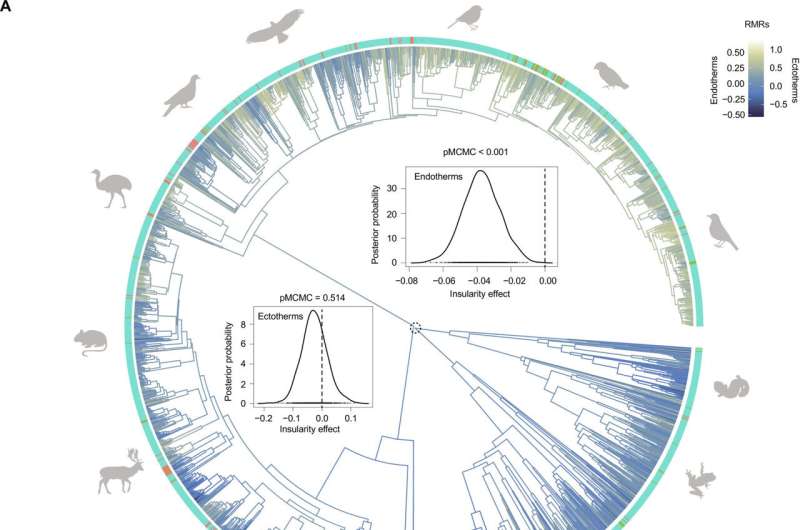July 18, 2024 report
This article has been reviewed according to Science X's editorial process and policies. Editors have highlighted the following attributes while ensuring the content's credibility:
fact-checked
peer-reviewed publication
trusted source
proofread
Slower metabolism of warm-blooded animals on islands correlated with higher risk of anthropogenic extinction

A multi-institutional team of zoologists and animal behavioral specialists in China and Germany has found an association between the slower metabolism of island-dwelling, warm-blooded animals and an increased risk of anthropogenic extinction.
In their study, published in the journal Science Advances, the group compared thousands of island animal species with similar-type mainland species to learn more about differences in metabolism rates and compared their risks of anthropogenic extinction.
Prior research has shown that over long time spans, animals evolve differently on islands than they do on continents. This is due to differences in predation and available resources. The result in some instances has been dwarfism and gigantism and birds that cannot fly.
In this new study, the research team has found that island-bound warm-blooded animals tend to have slower metabolisms than those living in mainland environments. They also found that they tend to reproduce more slowly and live longer—characteristics that help them survive on an island but put them at risk when conditions change, usually due to the arrival of humans.
The research team wanted to know if such characteristics put these creatures at higher risk of anthropogenic extinction. To find out, they looked for and analyzed data on 2,118 species of warm-blooded animals that had reasonably closely related mainland species. They did the same with data from 695 cold-blooded species.
In making comparisons, the research team was able to confirm that warm-blooded island species (mostly mammals and birds) tend to have slower metabolisms on average than similar mainland species. They found no discernable difference with cold-blooded animals.
The researchers then compared anthropogenic extinction risk between slower metabolism island species and similar mainland species and found that the island species tend to face a higher likelihood of anthropogenic extinction.
The team suggests the difference is likely due to resilience in mainland species. The slower lifestyle of island species makes it more difficult to respond to changes, they note, or to recover once changes occur. They suggest it also likely works in tandem with other island features to make life more difficult when changes do occur.
More information: Ying Xiong et al, Convergent evolution toward a slow pace of life predisposes insular endotherms to anthropogenic extinctions, Science Advances (2024). DOI: 10.1126/sciadv.adm8240
Journal information: Science Advances
© 2024 Science X Network



















